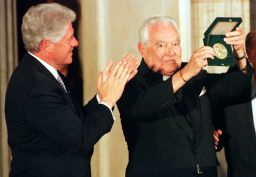A sex expert and a Catholic priest might sound like the set-up to a bad joke, but they happen to be the subjects of two worthwhile if mildly flawed documentaries, highlighting the over-sized roles that Dr. Ruth Westheimer and Father Theodore Hesburgh came to occupy in the culture.
Westheimer is such an irrepressible figure that you almost can’t help but enjoy “Ask Dr. Ruth,” an account of the 90-year-old sex expert’s remarkable life. Her buoyant personality smooths over the shortcomings of a movie that brings together the various strands of her life in a warm if slightly disjointed manner.
There’s also a too-dutiful tone to “Hesburgh,” a documentary about the late Notre Dame president, who guided the university through an immensely tumultuous period, serving as a civil-rights champion and adviser and confidant to presidents and world leaders along the way.
Westheimer’s is a remarkable self-made success story, a woman who left Germany at age 10 – having lost her family to the Holocaust – and became a ubiquitous media figure, “the happy munchkin of sex,” as a profile by Diane Sawyer describes her.
At its best, “Ask Dr. Ruth” zeroes in on the roots of that appeal, how Westheimer made her improbable move into radio, disarming audiences by speaking about sex in a frank, unflinching way.
Not surprisingly, her approach – a grandmotherly persona, bluntly dispensing advice using clear but clinical language – made her catnip for latenight comics, fueling appearances across the TV spectrum. In one of the funniest anecdotes, her son – then a college student – recalls hearing his mother’s voice emanating from dorm rooms as he walked down the hallway.
Westheimer also left her mark in a political sense, without consciously embracing that role. Her discussions of HIV and AIDS offered a key note of sobriety, in contrast to more hysterical voices, when the epidemic began.
Director Ryan White doesn’t fare as well in chronicling Westheimer’s personal biography, employing rather stiff-looking animation to illustrate recollections about her childhood.
It’s a quibble, perhaps, but given what an asset Westheimer is – giving directions to the cameraman and fussing over the crew –every decision that takes the camera off her feels like a misguided one.

“Hesburgh,” meanwhile, relies a little too heavily on Hesburgh’s own words – read by voice actor Maurice LaMarche, and accompanied by florid music – in documenting his life from entering the priesthood through his death in 2015, at the age of 97.
Frankly, the observations from those familiar with the man known as “America’s priest” feel more impactful, such as journalist Ted Koppel lamenting the disappearance of figures like Hesburgh, who “belonged to the side of decency.”
As “Ask Dr. Ruth” notes, Westheimer’s show was actually accused of being indecent its early days, but the two movies feel well matched. Not only are they a tribute to the current documentary renaissance, but they offer a reminder that larger-than-life personalities worthy of such treatment come in all shapes and sizes.
“Ask Dr. Ruth” and “Hesburgh” premiere May 3 in select theaters. The former comes to Hulu on June 1.




